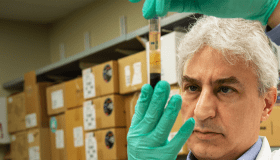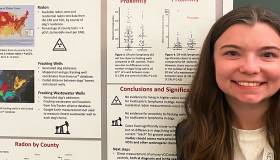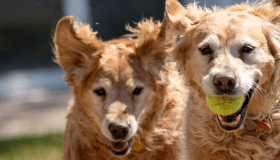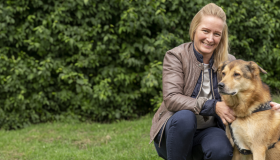
DENVER/July 21, 2022 – For dogs diagnosed with osteosarcoma, especially large and giant-breed dogs, treatment options are few and often too late. To improve these outcomes, Morris Animal Foundation recently announced it is funding a study at The Ohio State University focused on investigating limb-sparing options for dogs diagnosed with osteosarcoma.
Led by Dr. Laura Selmic, Associate Professor in the Department of Veterinary Clinical Sciences within the College of Veterinary Medicine and the project’s Principal Investigator, the study team’s goal is to advance the treatment of and improve the prognosis for dogs diagnosed with osteosarcoma that receive radiation therapy for their cancer.
Osteosarcoma is the most common primary bone tumor diagnosed in dogs. The cancer disproportionally affects the long bones of large and giant-breed dogs. Current treatment regimens include limb amputation, which can be difficult or impossible in some cases, particularly for giant-breed dogs. Radiation therapy is an option for these patients, but the therapy can weaken the bone and lead to fractures after treatment.
Selmic’s team will first use artificial intelligence-assisted computer modeling to estimate fracture risk in dogs with osteosarcoma in a limb. For dogs determined to have a high fracture risk, the group will then test the efficacy of a special implant designed to stabilize the affected bone post-radiation treatment. The results could give owners and veterinary oncologists more therapeutic options.
“We are very excited to be working together with Ali Nassiri, a research faculty member from the College of Engineering, on this project,” said Selmic. “We feel strongly there is a need to advance limb-sparing options in large and giant-breed dogs as current choices have high complication rates.”
“This study could help improve outcomes for dogs undergoing radiation therapy – those who are not considered to be good candidates for amputation,” said Dr. Janet Patterson-Kane, Morris Animal Foundation Chief Scientific Officer. “If successful, we have the potential to enhance their quality of life and healthspan, after receiving such a devastating diagnosis.”
The grant is funded by Dr. Fay Cho, a long-time lover of Saint Bernards, in memory of Biscotti, a beloved dog she lost to osteosarcoma. Working closely with the Foundation, Cho directed funds to research aimed at improving the success of limb-sparing treatment options for Saint Bernards and other giant breeds.
“I’ve had dogs with many different types of cancer,” said Cho. “I made a promise to Biscotti as she was drawing her last breath that I would do something to help other dogs with this terrible disease. This grant is a fulfillment of that promise.”
Cancer impacts animals worldwide and is a leading cause of death in dogs over the age of 2. Since 1962, Morris Animal Foundation has funded more than 300 cancer studies, invested nearly $40 million, and continues to make strides against the disease.
About Morris Animal Foundation
Morris Animal Foundation’s mission is to bridge science and resources to advance the health of animals. Founded in 1948 and headquartered in Denver, it is one of the largest nonprofit animal health research organizations in the world, funding more than $142 million in critical studies across a broad range of species. Learn more at morrisanimalfoundation.org.
Media Contact: Dane Madrid




